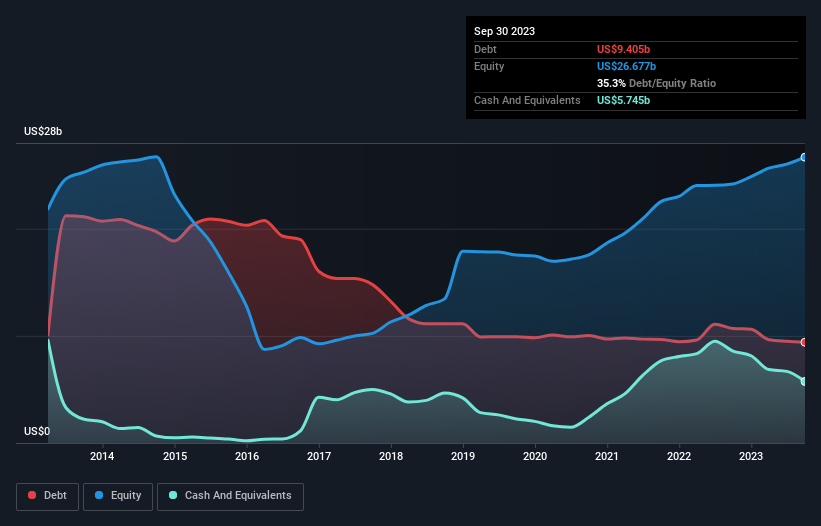- United States
- /
- Metals and Mining
- /
- NYSE:FCX
We Think Freeport-McMoRan (NYSE:FCX) Is Taking Some Risk With Its Debt
Howard Marks put it nicely when he said that, rather than worrying about share price volatility, 'The possibility of permanent loss is the risk I worry about... and every practical investor I know worries about.' So it seems the smart money knows that debt - which is usually involved in bankruptcies - is a very important factor, when you assess how risky a company is. Importantly, Freeport-McMoRan Inc. (NYSE:FCX) does carry debt. But is this debt a concern to shareholders?
Why Does Debt Bring Risk?
Generally speaking, debt only becomes a real problem when a company can't easily pay it off, either by raising capital or with its own cash flow. In the worst case scenario, a company can go bankrupt if it cannot pay its creditors. However, a more usual (but still expensive) situation is where a company must dilute shareholders at a cheap share price simply to get debt under control. Of course, plenty of companies use debt to fund growth, without any negative consequences. When we think about a company's use of debt, we first look at cash and debt together.
View our latest analysis for Freeport-McMoRan
How Much Debt Does Freeport-McMoRan Carry?
You can click the graphic below for the historical numbers, but it shows that Freeport-McMoRan had US$9.41b of debt in September 2023, down from US$10.7b, one year before. However, because it has a cash reserve of US$5.75b, its net debt is less, at about US$3.66b.

How Healthy Is Freeport-McMoRan's Balance Sheet?
The latest balance sheet data shows that Freeport-McMoRan had liabilities of US$4.86b due within a year, and liabilities of US$20.1b falling due after that. On the other hand, it had cash of US$5.75b and US$1.28b worth of receivables due within a year. So its liabilities outweigh the sum of its cash and (near-term) receivables by US$17.9b.
This deficit isn't so bad because Freeport-McMoRan is worth a massive US$58.7b, and thus could probably raise enough capital to shore up its balance sheet, if the need arose. But we definitely want to keep our eyes open to indications that its debt is bringing too much risk.
In order to size up a company's debt relative to its earnings, we calculate its net debt divided by its earnings before interest, tax, depreciation, and amortization (EBITDA) and its earnings before interest and tax (EBIT) divided by its interest expense (its interest cover). This way, we consider both the absolute quantum of the debt, as well as the interest rates paid on it.
Freeport-McMoRan's net debt is only 0.44 times its EBITDA. And its EBIT covers its interest expense a whopping 14.6 times over. So we're pretty relaxed about its super-conservative use of debt. The modesty of its debt load may become crucial for Freeport-McMoRan if management cannot prevent a repeat of the 23% cut to EBIT over the last year. When it comes to paying off debt, falling earnings are no more useful than sugary sodas are for your health. There's no doubt that we learn most about debt from the balance sheet. But it is future earnings, more than anything, that will determine Freeport-McMoRan's ability to maintain a healthy balance sheet going forward. So if you want to see what the professionals think, you might find this free report on analyst profit forecasts to be interesting.
Finally, a business needs free cash flow to pay off debt; accounting profits just don't cut it. So it's worth checking how much of that EBIT is backed by free cash flow. Looking at the most recent three years, Freeport-McMoRan recorded free cash flow of 41% of its EBIT, which is weaker than we'd expect. That's not great, when it comes to paying down debt.
Our View
We feel some trepidation about Freeport-McMoRan's difficulty EBIT growth rate, but we've got positives to focus on, too. For example, its interest cover and net debt to EBITDA give us some confidence in its ability to manage its debt. We think that Freeport-McMoRan's debt does make it a bit risky, after considering the aforementioned data points together. That's not necessarily a bad thing, since leverage can boost returns on equity, but it is something to be aware of. When analysing debt levels, the balance sheet is the obvious place to start. However, not all investment risk resides within the balance sheet - far from it. Case in point: We've spotted 1 warning sign for Freeport-McMoRan you should be aware of.
If you're interested in investing in businesses that can grow profits without the burden of debt, then check out this free list of growing businesses that have net cash on the balance sheet.
New: AI Stock Screener & Alerts
Our new AI Stock Screener scans the market every day to uncover opportunities.
• Dividend Powerhouses (3%+ Yield)
• Undervalued Small Caps with Insider Buying
• High growth Tech and AI Companies
Or build your own from over 50 metrics.
Have feedback on this article? Concerned about the content? Get in touch with us directly. Alternatively, email editorial-team (at) simplywallst.com.
This article by Simply Wall St is general in nature. We provide commentary based on historical data and analyst forecasts only using an unbiased methodology and our articles are not intended to be financial advice. It does not constitute a recommendation to buy or sell any stock, and does not take account of your objectives, or your financial situation. We aim to bring you long-term focused analysis driven by fundamental data. Note that our analysis may not factor in the latest price-sensitive company announcements or qualitative material. Simply Wall St has no position in any stocks mentioned.
About NYSE:FCX
Freeport-McMoRan
Engages in the mining of mineral properties in North America, South America, and Indonesia.
Solid track record with excellent balance sheet.
Similar Companies
Market Insights
Community Narratives



